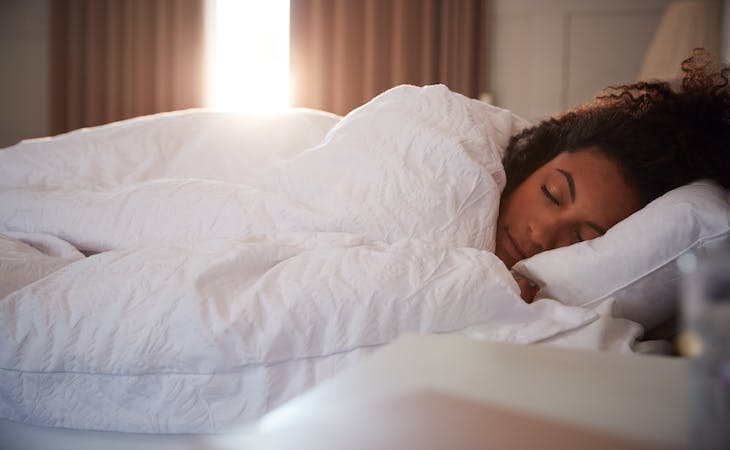You’re probably well aware that sleep is an essential part of overall health and well-being. (Just try to make it through a workday on too little shuteye.)
But how much have you really thought about how it all works and what happens to your mind and body while you’re sleeping (or attempting to snooze)?
Sometimes, the only way to do a task more successfully is to learn more about how it works. So, to that end: Let’s take a trip back to school and learn about the sleep cycle, what happens during the stages of sleep, and how to get healthier sleep.
What is the sleep cycle?
The sleep cycle is more complicated than you might imagine. It actually consists of five stages of sleep, each of which can last anywhere from about five to 15 minutes. [1]
“Sleep occurs in cycles of about 90 to 110 minutes, with several cycles happening throughout the night,” explains Andres Moran, co-founder and CEO of Complete Sleep. “Each cycle consists of two main types of sleep: Non-REM (NREM) and REM sleep.
NREM sleep consists of stages 1 through 4 and accounts for about 75% of adult sleep, while the fifth stage, REM sleep, accounts for 25%. [1]
Fun fact: Babies spend about 50% of their sleep in the REM stage. [2] “Infants spend a significant portion of their sleep time in REM sleep which totals up to 14 hours each day,” says Adrian Pristas, MD, medical director of the Center for Sleep Medicine at Hackensack Meridian Health. “As we age, our sleep requirements decrease. Young adults and teenagers require seven to nine hours of sleep, but adults over 50 need seven to eight hours.”
Stages of sleep
As we mentioned above, there are five distinct stages of sleep—and each one serves a rather specific function. Ahead, let’s explore what happens in each stage of the sleep cycle.
Stage 1
The first stage of sleep is light sleep. During this stage, you drift in and out of sleep, your eyes move slowly, and muscle activity starts to wind down. It’s very easy to be awakened when you’re in the first stage of sleep. [1, 3]
According to Moran, this is the transition between wakefulness and sleep and lasts for as little as a few minutes.
It’s “characterized by slowing brain waves” and sudden muscle contractions, says Moran—but be aware that you can be easily awakened during this stage.
This is also when you might experience the feeling of falling, which can cause sudden muscle contractions, a phenomenon known as hypnic myoclonia. [4]
If you’re woken up during this sleep stage, you might feel like you haven’t slept at all.
Stage 2
This is when sleep really begins. “Your body temperature drops, heart rate slows, and your brain produces what we call sleep spindles—these are crucial for memory and learning,” says Rafaid Fadul, MD, a triple board-certified expert in pulmonary medicine, critical care, and sleep health. [1]
Stages 3 and 4: deep sleep
Stages three and four of sleep (known as deep sleep or slow-wave sleep) are characterized by slow delta brain waves. [5]
It’s the deepest and most restorative sleep you’ll experience during the night. [1] Deep sleep is crucial for refreshing your mind and body for the next day.
“Non-REM Stage 3, or deep sleep, is when your body does its repair work,” explains Fadul, who says this is when tissues heal, muscles build, and your immune system strengthens. [1] Most of this happens in the first half of the night.
If you’re woken up during a deep sleep stage, you might feel disoriented for a while—but it might actually be very difficult to be woken up at all at this point in your sleep cycle. [1]
Older adults have trouble entering a state of deep sleep—they also tend to sleep less and wake up more often. [6]
It’s also in these stages of sleep that people experience parasomnias (disruptive sleep disorders), such as sleepwalking. That’s because parasomnias tend to occur when you’re transitioning from non-REM to REM sleep. [1, 7]
Stage 5: REM sleep
This sleep stage usually occurs after the first 90 minutes of sleep. [1] The first instance of REM sleep usually lasts around 10 minutes, and each subsequent REM sleep period throughout the night gets longer. [1]
Your final period of REM sleep will last about an hour. During this stage of sleep, your eyes stay closed, but they move super-quickly from side to side. [1]
You also experience increased brain activity at this point in the sleep cycle, which is why dreams most commonly take place in REM sleep. [1] You may dream anywhere from four to six times a night. (Here are common causes of crazy dreams.)
Your body relaxes in REM sleep and your muscles stop moving. “Your brain becomes almost as active as when you’re awake, yet your body is temporarily paralyzed,” says Fadul.
This paralysis, notes The Better Sleep Council, is a protective measure to stop you from acting out your dreams. [8]
Factors that affect sleep stages
Several key factors influence your sleep architecture. According to Fadul, these can include:
- Age: “Older adults naturally get less deep sleep,” he says. Remember those teenage years when you could sleep through an earthquake? There’s a reason you can’t do that anymore. “By age 50, we spend only 5-10% of our night in deep sleep, compared to the 20% we got in our youth,” explains Fadul.
- Stress and anxiety: “High stress keeps your nervous system in fight or flight mode, making it nearly impossible to reach deep, restorative sleep,” says Fadul. [9] One simple fix? The 4-7-8 breathing technique (inhale for four, hold for seven, exhale for eight). “It helps shift your nervous system into “rest and digest” mode—exactly where it needs to be for quality sleep,” said Dr. Fadul.
- Alcohol: That glass of wine might feel like a shortcut to sleep, but here’s the truth: “It’s like paying for dinner with a credit card—you’ll deal with the debt later,” says Fadul. “Alcohol reduces REM sleep by up to 40% in the first half of the night, which is why you wake up feeling like you just pulled an all-nighter—even if you didn’t.” [10, 11]
- Medications: Your daily meds might be sabotaging your sleep without you even realizing it. Common culprits? “Antidepressants, beta-blockers, and even over-the-counter sleep aids,” says Fadul. “Some suppress REM sleep, while others keep you from entering deep sleep altogether.” [12] If you’re constantly tired despite getting a full night’s rest, it’s worth checking in with your doctor about timing or alternatives.
- Exercise time: Working out is great for sleep…unless you’re hitting a HIIT session right before bed. “Your body temperature needs to drop by two to three degrees for optimal sleep, but intense workouts keep you running hot,” says Fadul. [13] The fix? Try finishing workouts at least three hours before bedtime.
- Screen time: That “just one more episode” or “quick social media check” is stealing your sleep.”Blue light from screens cuts melatonin production by up to 50%, tricking your brain into thinking it’s still daytime,” says Fadul. [14] “Give yourself a head start—cut screens at least 90 minutes before bed, and let melatonin do its thing.” Your social media feeds will still be there tomorrow.
- Room temperature: Think of your bedroom as a sleep cave—cool and dark is the way to go. “The ideal sleep temperature? 60-67°F (15-19°C),” says Fadul. “If your room is too warm, you’ll spend more time tossing and turning than actually sleeping.” If you’re waking up sweaty, drop your thermostat by just two degrees and see the difference.
How to improve your sleep cycle
Want to improve your sleep cycle? Your best course of action is to modify the elements currently interfering with your sleep.
Some great ways to start improving your sleep:
- Limit screen time before bed: “Your brain needs a clear signal to shift from go-go-go to time to sleep, says Fadul. He advises setting a tech curfew 90 minutes before bed—yes, even on weekends! You should also switch your phone to night mode when the sun goes down. “Make your bedroom a no-phone zone, and read a book or journal instead of reaching for your phone,” he says. “If screens are unavoidable, use blue-light blocking glasses to minimize disruption.”
- Creating a comfortable bedroom: Think of your bedroom as a personal sleep oasis. Here’s how to optimize it, according to Fadul: Install blackout curtains or use a sleep mask. Keep the temperature between 60-67°F (15-19°C) for ideal sleep conditions, and choose breathable bedding to prevent overheating. You might also want to use a white noise machine to block out disruptions and declutter your space and switch to a switch to warm, dim lighting in the evening to support melatonin production.
- Consider expert help. It’s a good idea to see a doctor if lifestyle changes aren’t doing the trick. If you wake up gasping or choking during sleep or your partner notices you stop breathing while sleeping, you should definitely visit your healthcare provider as this could be a sign of sleep apnea, says Fadul. [15] He also says it’s important to see a doctor if you get seven to eight hours of sleep but still feel exhausted, your fatigue is affecting your daily life, or you’ve made consistent changes for four to six weeks with no improvement.
The bottom line: Quality sleep isn’t a luxury—it’s as essential as food and water. “Start with one small change tonight—whether it’s setting a tech curfew or upgrading your sleep environment,” says Fadul. Your well-rested future self will thank you.
FAQs
What are the five stages of sleep?
Stage 1 is a light stage of sleep, where it’s easy to be woken up. Stage 2 is still light sleep but a little deeper than stage 1. It’s on its way to more meaningful rest. Stage 3 begins deep sleep, while stage 4 continues deep sleep. Stage 5 is the final, REM stage of sleep.
Which is better: REM or deep sleep?
Neither is “better” when comparing REM and deep sleep, they’re both essential for different reasons. “Deep sleep handles physical restoration, while REM sleep takes care of mental restoration,” says Fadul. “It’s like asking whether your heart or lungs are more important—you need both to function properly.”
How much of each stage of sleep should you get?
Fadul says for healthy adults, a typical night’s sleep breaks down to: [1]
- Stage 1: About 5%
- Stage 2: 45%-55%
- Stages 3-4 (Deep Sleep): 15%-25%
- Stage 5 (REM): 20%-25%
How many hours or REM sleep do you need?
Most adults need about 90 to 120 minutes of REM sleep per night. “This typically requires seven to nine hours of total sleep,” says Fadul. “REM periods get longer as the night progresses, with the longest periods occurring in the final third of sleep.”
Next, learn all about lucid dreaming and what you can do to control what happens in your dreams.
References
- Patel AK, Reddy V, Shumway KR, et al. Physiology, Sleep Stages. [Updated 2024 Jan 26]. In: StatPearls [Internet]. Treasure Island (FL): StatPearls Publishing; 2025 Jan-. Available from: https://www.ncbi.nlm.nih.gov/books/NBK526132/
- Grigg-Damberger MM. The visual scoring of sleep in infants 0 to 2 months of age. J Clin Sleep Med 2016;12(3):429–445. https://pubmed.ncbi.nlm.nih.gov/26951412/
- Cleveland Clinic. Sleep. https://my.clevelandclinic.org/health/body/12148-sleep-basics
- Alghamdi, S. A. (2023). Hypnic Jerks, Major Depressive Disorder, and Antidepressant Use: A Possible Relationship. Cureus, 15(10), e47436. https://doi.org/10.7759/cureus.47436
- Purves D, Augustine GJ, Fitzpatrick D, et al., editors. Neuroscience. 2nd edition. Sunderland (MA): Sinauer Associates; 2001. Stages of Sleep. Available from: https://www.ncbi.nlm.nih.gov/books/NBK10996/
- Medline Plus. Aging changes in sleep. https://medlineplus.gov/ency/article/004018.htm
- Fleetham, J. A., & Fleming, J. A. (2014). Parasomnias. CMAJ : Canadian Medical Association Journal, 186(8), E273. https://doi.org/10.1503/cmaj.120808
- The Better Sleep Council. What’s Really Going on When You Hit the Sack. https://bettersleep.org/sleep-extras/stages-of-sleep/
- Kim, J., & Dimsdale, J. E. (2007). The Effect of Psychosocial Stress on Sleep: A Review of Polysomnographic Evidence. Behavioral Sleep Medicine, 5(4), 256. https://doi.org/10.1080/15402000701557383
- Helaakoski, V., Kaprio, J., Hublin, C., Ollila, H. M., & Latvala, A. (2022). Alcohol use and poor sleep quality: A longitudinal twin study across 36 years. SLEEP Advances, 3(1). https://doi.org/10.1093/sleepadvances/zpac023
- Sleep Foundation. Alcohol and Sleep. https://www.sleepfoundation.org/nutrition/alcohol-and-sleep
- Harvard Health Publishing. Are your medications keeping you up at night? https://www.health.harvard.edu/diseases-and-conditions/are-your-medications-keeping-you-up-at-night
- Johns Hopkins Medicine. Exercising for Better Sleep. https://www.hopkinsmedicine.org/health/wellness-and-prevention/exercising-for-better-sleep
- Heo, J. Y., Kim, K., Fava, M., Mischoulon, D., Papakostas, G. I., Kim, M. J., Kim, D. J., Chang, K. J., Oh, Y., Yu, B. H., & Jeon, H. J. (2017). Effects of smartphone use with and without blue light at night in healthy adults: A randomized, double-blind, cross-over, placebo-controlled comparison. Journal of psychiatric research, 87, 61–70. https://doi.org/10.1016/j.jpsychires.2016.12.010
- National Heart, Lung, and Blood Institute. Sleep Apnea Symptoms. https://www.nhlbi.nih.gov/health/sleep-apnea/symptoms






